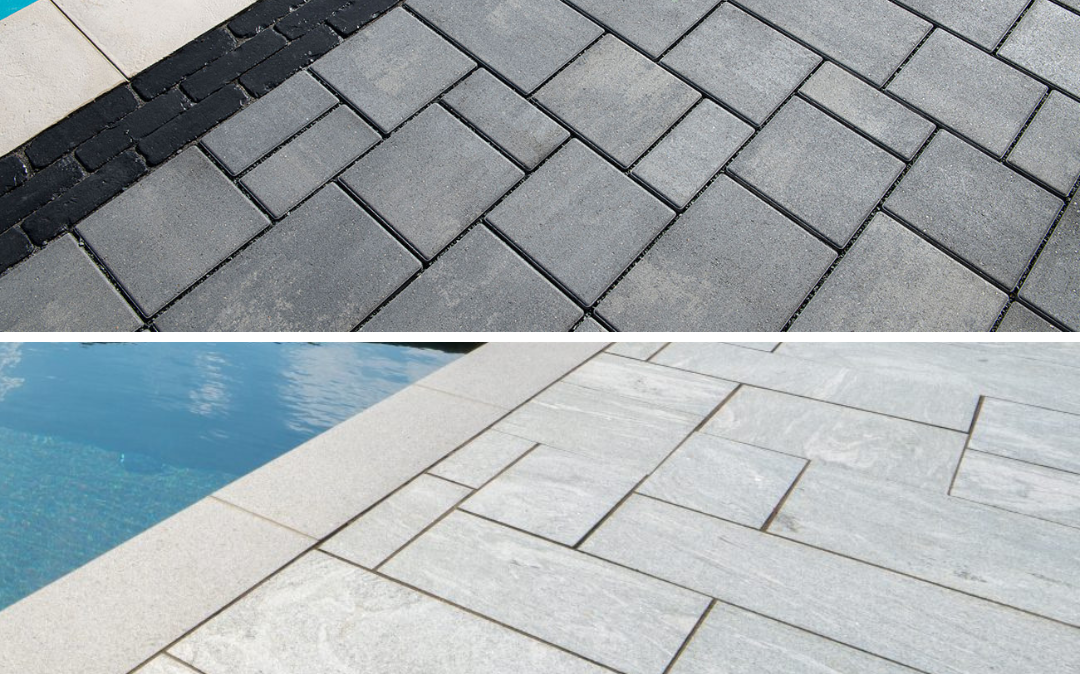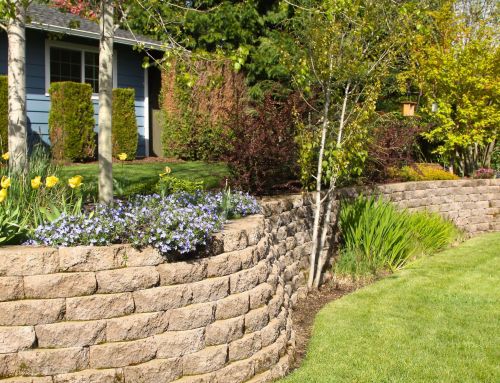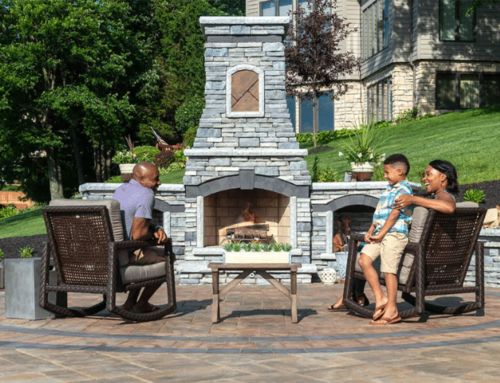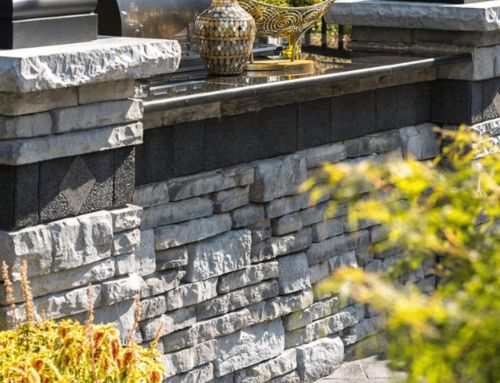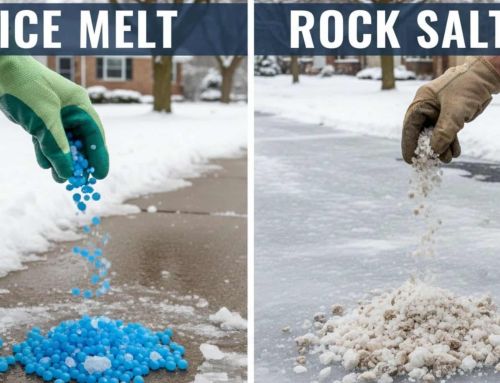Choosing the right material for your outdoor space can be a daunting task, especially when it comes to deciding between concrete and natural stone. Both materials offer unique advantages and considerations that can influence the overall look, durability, and maintenance of your outdoor space. Aesthetic preferences play a significant role in choosing between concrete and stone, as the visual appeal and style should match your desired design vision. Selecting different materials, such as concrete and stone, can greatly impact the outcome of your project in terms of aesthetics, durability, and cost-effectiveness. In this blog, we will explore the advantages and considerations of using concrete and natural stone in your outdoor projects.
Introduction to Concrete and Natural Stone
When planning landscaping projects, the choice between natural stone and concrete is one of the most important decisions you’ll make. Natural stone, prized for its timeless elegance and one-of-a-kind appearance, is a natural material that brings a sense of authenticity and history to any outdoor space. In contrast, concrete is a man-made material known for its versatility and cost-effective option for modern designs. Both materials have unique advantages and are suitable for different applications, so understanding their characteristics is essential for selecting the right material for your project. Whether you’re aiming for a classic look or a contemporary feel, knowing the strengths and limitations of concrete and natural stone will help you achieve the best results for your outdoor space.
Material Composition and Appearance
Natural stone is sourced directly from stone quarries and is composed of natural materials such as limestone, granite, and sandstone. Each stone features visually stunning, unique patterns and irregular shapes that add character and depth to outdoor spaces. The natural variations in color and texture make every installation truly one of a kind, enhancing the overall aesthetic appeal of patios, walkways, and garden features.
Concrete, on the other hand, is crafted from a blend of cement, sand, and aggregate. While concrete may not offer the same organic beauty as natural stone, it can be designed to suit a wide range of styles. Techniques like stamping, staining, and texturing allow concrete to mimic the look of other materials, providing an aesthetically pleasing and uniform appearance. The material composition and appearance of both concrete and natural stone play a crucial role in determining which is best suited for your landscaping project, depending on your desired look and feel.
Advantages of Concrete
![]()
Concrete is a versatile material that can be customized to suit a variety of styles and designs. It can be poured into any shape or size, allowing for endless possibilities when it comes to creating unique outdoor features. Concrete offers a cost-effective alternative to natural stone, perfect for enhancing outdoor spaces affordably and stylishly. When considering concrete costs, it’s important to note that while initial installation expenses are lower than natural stone, long-term maintenance and replacement can increase overall expenses. Thanks to mass production, concrete has become widely available and affordable for large-scale projects. Concrete pavers are a popular choice for patios and walkways, offering flexibility in design and installation.
Another advantage of concrete is its durability and low maintenance. Concrete is durable against weather, heavy foot traffic, and regular use, showing minimal signs of wear over time. Additionally, concrete requires minimal maintenance. Occasional sealing and cleaning are all that is needed to keep it looking its best. Concrete may develop cracks over time, particularly if installation is flawed or the ground beneath shifts unexpectedly. A crack can compromise both the durability and appearance of the surface, making proper installation and maintenance essential.
Cost and Budget Considerations
When it comes to cost, natural stone and concrete differ significantly. Natural stone is generally more expensive, with installation costs typically ranging from $15 to $30 per square foot. This higher price reflects the exceptional durability and unique beauty that stone offers. Concrete, by comparison, is a more cost-effective option, with installation costs usually between $5 and $15 per square foot. While concrete is attractive for those on a tighter budget, it’s important to consider long-term value. Natural stone requires less maintenance over time and can last for decades, making it a cost-effective choice in the long run for those seeking lasting quality and minimal upkeep. Weighing the initial investment against ongoing maintenance and durability will help you choose the best material for your needs and budget.
Environmental Impact
The environmental impact of your material selection is an increasingly important consideration in today’s landscaping projects. Natural stone is a sustainable choice, as it is biodegradable, reusable, and has a lower carbon footprint compared to concrete. Its extraction and use have less impact on the environment, especially when sourced responsibly from local stone quarries. Concrete, however, has a higher carbon footprint due to the energy-intensive production of cement. That said, concrete can be made more eco-friendly by incorporating recycled materials, reducing its overall environmental impact. When planning your next project, consider the sustainability of each material and how your choice can contribute to a greener, more environmentally responsible outdoor space.
Best Uses for Concrete and Natural Stone
Both concrete and natural stone excel in different applications, making them suitable for a variety of landscaping projects. Concrete is a cost-effective option for large-scale installations such as driveways, retaining walls, and areas that need to withstand heavy loads. Its uniform appearance and ability to be molded into interlocking pavers or stamped concrete make it ideal for modern, functional outdoor spaces. However, concrete is highly prone to cracking and may require regular maintenance to address stains and surface cracks, especially in areas with temperature fluctuations.
Natural stone, with its timeless appeal and exceptional durability, is perfect for patios, pool decks, and outdoor living spaces where aesthetics and long-term value are priorities. Stone pavers can handle heavy traffic and temperature changes, making them a reliable choice for high-use areas. Their unique patterns and natural beauty create visually stunning features that elevate any outdoor space. By understanding the best uses for each material, you can make an informed decision that ensures your landscaping project is both beautiful and built to last.
Natural Stone Uses
Natural stone, on the other hand, offers a timeless and elegant look that cannot be replicated by any other material. Every natural stone piece is unique, boasting distinct color variations, patterns, and textures that enhance outdoor spaces with charm and character. There is a wide variety of stones available, each with unique qualities that contribute to both the beauty and functionality of your landscape. Natural stone offers versatility with options like flagstone, limestone, slate, and travertine, enabling personalized outdoor spaces to match your style perfectly. Natural stone pavers provide additional benefits such as customization, weather resistance, eco-friendliness, and long-term durability, making them an excellent choice for outdoor hardscaping projects.
In terms of durability, natural stone is known for its strength and resilience. It is highly durable and able to withstand harsh environmental conditions, resisting wear and tear over time. The pressure resistance of natural stone can be measured in pounds per square inch (PSI), demonstrating its superior load-bearing capacity compared to other materials. It is a material that can last for decades, even centuries, without losing its beauty or structural integrity. Natural stone is also heat-resistant, making it a comfortable surface to walk on during hot summer days.
Natural stone requires minimal maintenance; occasional sealing and cleaning maintain its beauty and durability for long-lasting outdoor elegance. Simple cleaning is often sufficient to keep natural stone looking its best. Occasional resealing is recommended to preserve the stone’s appearance and prevent damage. Proper maintenance is essential for maximizing the lifespan of natural stone and preventing issues such as cracking. Regular sealing acts as a preventive measure, protecting the surface from stains, cracks, and weathering.
Considerations for Concrete
Concrete offers numerous benefits, yet it’s essential to consider factors specific to using this material in your outdoor environment. Concrete may develop cracks over time, particularly if installation is flawed or the ground beneath shifts unexpectedly. Cracks can be unsightly and may require repairs to ensure the structural integrity of the concrete surface. However, proper maintenance can help prevent or minimize cracking and extend the lifespan of your concrete.
Concrete can stain and discolor over time, particularly in high-traffic areas or where spills are frequent, requiring regular maintenance. Sealing helps prevent staining, but concrete generally demands more upkeep than natural stone due to its porous nature. As a result, concrete typically requires more maintenance than stone, including frequent cleaning and resealing to maintain its appearance and durability. The maintenance requirements for concrete are higher compared to other materials like natural stone, which is often more durable and low-maintenance over time.
Considerations for Natural Stone
Similarly, choosing natural stone for your outdoor space requires considering certain factors. One factor is cost, as natural stone typically exceeds concrete in expense. However, homeowners may find the unique beauty and durability of natural stone outweigh the initial investment for creating a stunning, long-lasting outdoor space. Natural stone is also a popular choice for constructing a retaining wall, offering both structural support and aesthetic appeal. In addition, natural stone is often used in water features, such as fountains or ponds, to enhance visual interest in outdoor designs. When comparing construction materials, natural stone stands out for its natural look and longevity compared to alternatives like concrete or manufactured options. Brick is another traditional material commonly used in landscaping for its classic appearance and versatility.
Another consideration for natural stone is its susceptibility to scratching and chipping, especially in high-traffic areas. Using gravel as a base or complementary material can help with drainage and stability in natural stone installations. While natural stone is durable, it is important to choose the right type of stone for your specific needs and to take precautions to protect it from damage. Bricks, as modular paving options, can also be used alongside stone to create flexible and easily repairable surfaces.
Summary
Both concrete and natural stone present advantages and considerations for selecting materials in outdoor projects. Concrete, a versatile and cost-effective option, delivers durability and requires minimal maintenance. In contrast, natural stone offers a timeless, elegant appearance, imbuing outdoor spaces with character and charm. By assessing your outdoor space’s requirements and evaluating each material’s merits and drawbacks, you can make an informed decision to enhance your outdoor area’s beauty and functionality for years ahead. Carefully weighing all factors will help ensure your final decision leads to long-term satisfaction and durability.
Need a Landscape & Masonry Supply in Norton, MA?
Discover everything you need for outdoor projects here at Old Station Supply in Norton, MA! Serving both contractors and homeowners, we offer a wide range of landscaping and construction supplies, from crushed stone to patio pavers and outdoor fire features. Our expert team is here to guide you through your project, ensuring success every step of the way. As an award-winning Massachusetts landscaping supply store, we prioritize customer satisfaction and have received accolades like Unilock Outstanding Sales Growth and American Express Member Favorite since 2014. Contact us today for all your project needs, from synthetic lawn supplies to ice melt products! At Old Station Supply, we’re dedicated to helping you keep your projects on track.

